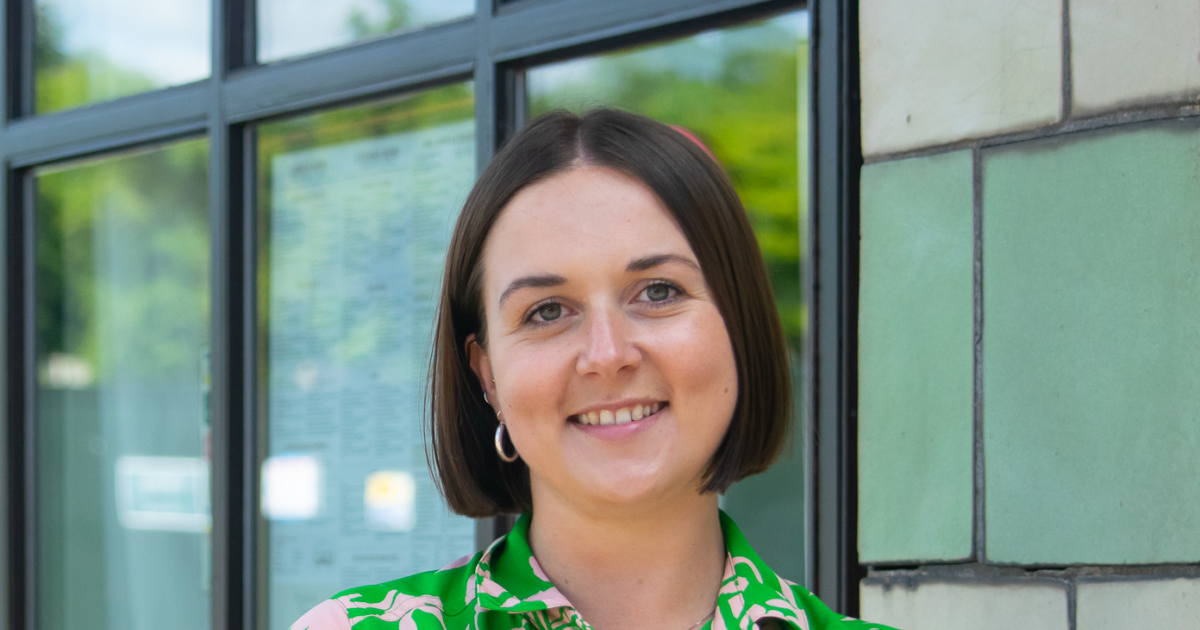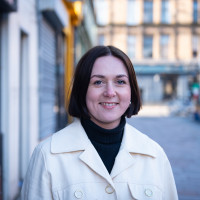Cllr Holly Bruce Autumn Conference 2024 closing speech
Glasgow's Green Cllr Holly Bruce closed the Scottish Green conference by marking the second anniversary of her landmark initiative to introduce feminist town planning to Glasgow.

I want to start by talking about this morning. I was unfortunately unable to make it along to the first two motion sessions as I had a long standing commitment of volunteering and taking part in the Moira Run, an annual fundraising run in Queens Park in the Southside of Glasgow.
The Moira Run is important because it celebrates the life of a woman who was brutally murdered in that very park, my local park, and the park that means so much to my community. It was an emotional but empowering morning and makes me proud to be part of a community that supports and looks after each other.
Violence Against Women and Girls touches every part of our lives, and it impacts so many of us. In Glasgow alone, it affects over 135,000 people. Safety remains one of the biggest concerns for women navigating their lives and it’s become clear from a growing body of research that how we use and design public space plays a crucial part in responding to violence in all its forms.
I’m very aware that feminist town planning, as a concept, is relatively new to folk and on the face of it seems abstract. We’ve heard and understood concepts like gender pay-gap, gender budgeting and gender mainstreaming, but little has been done or said on gendered geography.
By having a geographical perspective on gender, it offers a new way of understanding how sexism functions on the ground and in our day to day lives. We know that male power and privilege is upheld by keeping women’s movement limited and access to spaces constrained and it’s our job as activists and as a party to challenge this status quo and reimagine our cities and communities into spaces where everyone can thrive.
A feminist city starts from a place where women, and those of marginalized genders, have a right to the city, are able to to walk, wheel or cycle around freely, are able to access public transport, childcare and greenspaces or can afford adequate housing.
And I don’t know about all of you, but I certainly don’t feel like I’m able to exercise that right fully.
Rewinding back a wee bit to lockdown 2020, where this policy was just a tiny little idea in my head. I had taken to reading, lots, as I’m sure many of us policy geeks did during that time, and had signed up to be part of Verso’s book club. I was randomly sent books based on my preferences. This led to Leslie Kern’s Feminist City being posted through my door, and a lightbulb moment happened.
Afterwards, I signed up and took part in the Young Women’s Movement Glasgow programme,where 23 women and non-binary people all under the age of 30 developed a research campaign. I pitched feminist town-planning as a proposal and we got started. Our research has since been the backbone of every discussion I’ve had on this subject. And in a nutshell, it was found that public spaces, transport and services need to be more affordable, safer, more accessible and convenient.
Our academic research also showed us that towns, cities and urban spaces were traditionally built by men and for men. So it’s unsurprising that decisions on planning and budgets that have been made in political spaces do not reflect the everyday experiences of the very diverse public.
These spaces have overwhelmingly been occupied by cis-gendered white men and today we can see this is still the case, within politics, planning, architecture, construction, and so many other sectors within the built environment. That is why this policy is so important, it becomes non-negoatibale.
It’s clear we need to start asking questions that emerge from the everyday embodied experience of women. And this needs to be intersectional. As an unmarried, childless, white, cis, able-bodied, 31 year old queer woman, I’m unable to fully understand the needs of all women. Intersectionality must be at the heart of a feminist town-planning approach.
It must be said that the main features of a healthy, climate-friendly city also aligns with gender-equal cities including walkability, proximity to services, mixed-use environments, a safe public realm and open greenspaces. These factors aren’t in contention and are not only important for women, they are key considerations for creating a healthier, more liveable city for all, with positive impacts in terms of health and wellbeing and air quality.
Public places that are better attuned to women’s security and practical needs would open up opportunities for women, and could lead to an increase in participation in political meetings, and ultimately women’s elected representation. It would present job opportunities, access to healthcare, culture and enhance their autonomy.
Unsurprisingly there has been some push back to this policy with the usual woke insults, with one councillor, calling it a load of nonsense within an actual committee meeting I sat in. Unfortunately these people will always exist and it is up to us to call this out whenever we can. A feminist, more equal city will benefit everyone.
Some interventions are relatively simple but could be hugely effective, like better pathway maintenance, widened pavements, sensitive landscaping design, safe active travel routes, public toilets, adequate lighting infrastructure, integrated, accessible and affordable transport, playparks built for girls, intergenerational living, childcare included within housing proposals, but these are not exhaustive and should always be informed by evidence and lived experience.
In Glasgow I’m delighted to co-chair the working group that is the main vehicle for actioning all this work. This is the place where we will be unpacking and reforming the city’s new development plan, and discussing a gender strategy for the city that will cut across all departments. This group also has the job of administering a 500k Feminist City Action Fund, negotiated by the glasgow green group, that will pay for capital project proposals, these are being worked up as we speak, so watch this space!
I must also mention the work of Ballie Martha Wardrop who seconded the motion and is working alongside me by steering the ship within the city development plan working group. A huge undertaking.
We know council’s have limited powers, resources and budgets, but we have the power and means to do this. To solidify equality within legally binding policy.
Structural, systemic change is an important part in progressing equality.
We are already seeing some tangible change in Glasgow. The campaign to implement sensitive lighting solutions within Queens Park is almost over the line, the council has started the work on developing it’s first public toilet strategy after a lot of convincing, we’ve seen changes in procurement within our livable neighbourhoods projects where draft designs must be drawn with a gendered lens, we’ve seen data from the Glasgow Girls Club survey being used to repair street lights and fix overgrown shubbery and we are seeing subsequent strategy development embedding feminist town-planning outset within the council’s recent cycling and urban sports strategy.
I’m overjoyed that other Scottish Green Councillors and MSPs are also prioritising women occupying space within their towns, cities and neighborhoods. Kayeligh O’Neill passed a similar motion within Edinburgh, I’ve been admiring Kirsten Robb’s Safe Space to Play policy from afar and nationally we have seen Gillian MacKay’s buffer zone bill.
But there is so much we can still do nationally. There are still elements of National Planning Framework 4 not being interpreted properly by councils, with little reference made to gender in urban planning. I’ve been working with the Chief Planner for Scotland Fiona Simpson, on how this can be adapted in the future and I’d like to thank Ariane Burgess for hosting a session on this within the Scottish Parliament. I’m sure we’ll have many more discussions about this in the future.
But we must acknowledge that as well as the systems change both in policy and law, a cultural change needs to go hand in hand. The Misogyny Bill, which intends to criminalise street harassment and cat-calling, will play a huge part in that change and I hope to see that be tabled and not scrapped before 2026.
It must be said that all of this is a huge undertaking and I am not the only person who holds this policy or this idea. So please get in touch, talk to your local councillors on how a gendered lens could be applied to their development plans and local place plans. This will take, not only us and our party to pursue but the whole of civic society to tackle.
I want to end by referring back to a quote that Patrick had said yesterday at the beginning of conference which I feel is pertinent, which is ‘we are the movement. We are the movement, for people, for planet and for peace. We are the change-makers and innovators. We are the ones with the biggest and newest ideas. System-change thinking does not happen overnight and each and everyone of us should be proud of the small difference we make every day for our party and communities.
